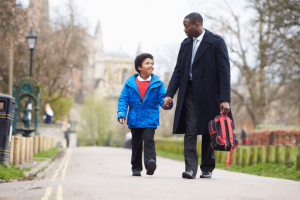Share
For many children and young people, the end of the holidays and a return to seeing friends each day is an exciting prospect. However, others may find the transition back-to-school – and the structure and routine that comes with that – daunting and overwhelming.
Change can be challenging to deal with, particularly for young people, and it’s completely normal to need some time to adjust.
Some children may be worried about aspects of the school itself, such as school work, making friends or having new teachers. There are other children who may have had a difficult experience over the summer holidays, such as a bereavement, family illness or conflict, or, experienced bullying – all of which can make it harder for them to feel settled at school again.
Signs your child or young person is anxious about school
● Not wanting to get up and get ready for school
● Saying they can’t go to school
● Having difficulty sleeping the night before school
● Reporting that they feel unwell – feeling sick, having a stomach ache or headache
● Avoiding completing homework that’s been set
● Withdrawing – seeming quieter than usual, being low in mood and isolating themselves from family and friends
● Worrying a lot about small issues, such as having the right equipment for school
● Being angry, upset, or acting out.

Five ways to help your child or young person manage back-to-school anxiety
1. Get prepared
In the days or weeks before school resumes, move toward a realistic school routine. By doing this gradually with bedtimes and wake times, this can be less difficult to adjust to when the time comes to go back-to-school. Ensure any holiday homework is completed and if your child has been given their new timetable, review this with them. Have all school supplies ready in good time. It may be useful to do a practice run or rehearsal of how your child will be getting to and from school, particularly if they will be attending a new school.
2. Meet up with school friends
If possible, arrange catch ups with one or more familiar peers toward the end of the holidays before school resumes. The presence of a friendly face during this transition period can help your child or young person adjust better.
3. Praise and reward
Don’t be afraid to use praise and rewards to encourage your child or young person to get back into their school routine. Try to be specific with your praise and use rewards to increase motivation, for example making them their favourite dinner or putting their favourite film on as a reward for getting out of bed and brushing teeth at the agreed time. Get your child involved in this process as this will be more meaningful to them.
4. Listen to fears and worries
If your child or young person expresses anxiety about returning to school, take time to listen to their fears or worries. Acknowledging and validating their feelings – “Thank you for sharing, that sounds difficult” – without immediately dismissing these – “There’s nothing to worry about, you’ll be fine” – can help your child feel more secure and able to discuss their concerns further with you. Ask if they would like you just to listen and talk about it, or if they are looking for solutions and strategies that you can find together. Whatever the case, try to avoid jumping straight to wanting to problem solve or ‘fix’ the problem for them.
5. Communicate with the school
Let the school know if your child is having anxiety about going back-to-school and see if they can offer any further support for a successful transition.
When to seek help from a medical professional: If problems with back-to-school anxiety persist or worsen, it’s important to seek guidance and support from your child’s school and a GP. They may recommend a referral to another service for assessment of the support your child may need to manage and overcome this.
Related News
Vita is an award-winning, CQC registered healthcare provider














